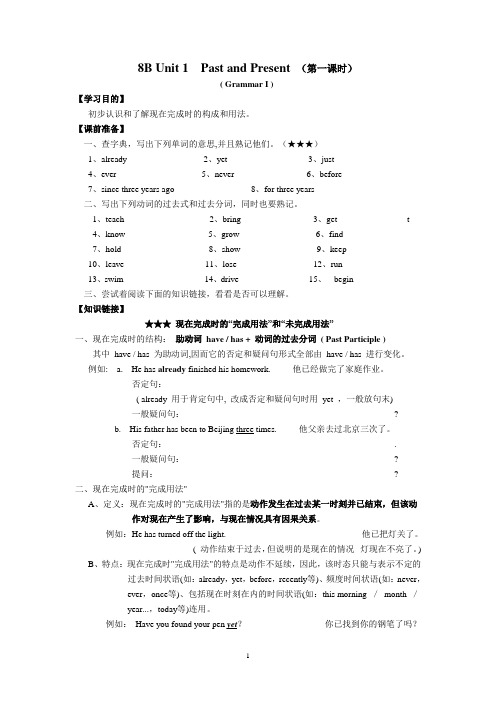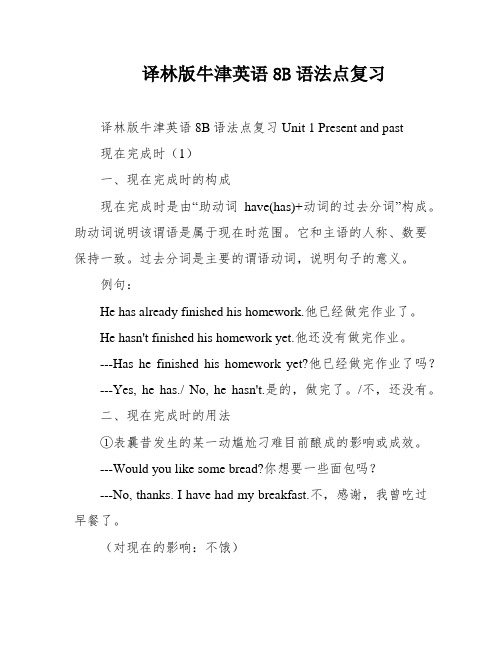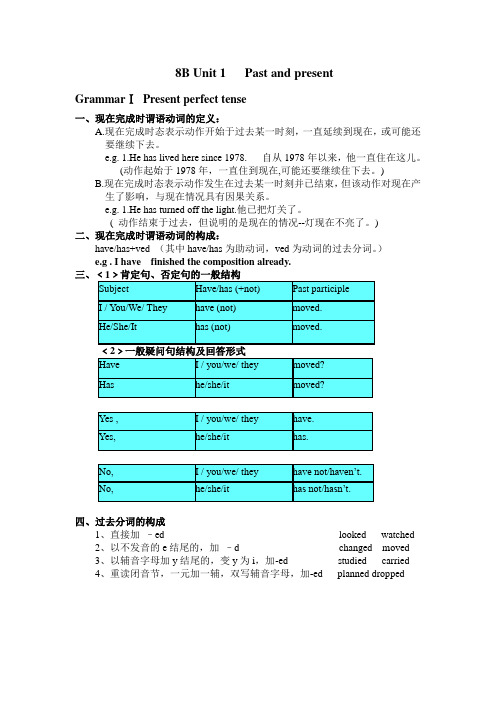8B Unit 1 现在完成时
- 格式:doc
- 大小:214.00 KB
- 文档页数:3

八年级英语8B Unit1Past and present译林版【本讲教育信息】一. 教学内容:8B Unit1Past and presentGrammar 现在完成时现在完成时用来表示之前已发生或完成的动作或状态,但它的影响现在还存在;也可表示持续到现在的动作或状态。
其构成:have (has) +过去分词。
规则变化的过去分词与过去式的变化一样,在动词词尾加ed; 不规则变化的过去分词见不规则动词表,需要同学记忆。
现以see the film为例将现在完成时的肯定句,否定句和疑问句列表如下:肯定句:I/You/We/They have seen the film.He/She /It has seen the film.否定句:I/You/We/They have not/ haven’t seen the film.He/ She/It has not/hasn’t seen the film.疑问句:Have I/you/they seen the film? Yes, you/ we/I/they have. No, you/ we/I/they ha ven’t.Has he/she/it seen the film? Yes, he/ she/ it has. No, he/ she/ it hasn’t.现在完成时中常用的一些表达:already: 已经,常用于肯定句中,放在句中或句末。
用于疑问句常表示惊讶疑惑。
yet 已经,还,常用于疑问句和否定句中,放在句末。
ever 曾经,常用于疑问句中,放在句中。
never 从不,表示否定,放在句中。
just刚刚,常用于肯定句中,放在句中。
since 自从…以来,后面接时间点或从句。
for 后面接一段时间。
例:I have finished my homework already.My cousin hasn’t returned the library book yet.They have just given the food to the poor boy.Have you ever spoken to a foreigner? No, never.I have known him since ten years ago/ for ten years.My sister has lived in Canada since she was born.现在完成时中应注意的几个问题1. have been to 和have gone to的区别have been to 强调“去过”,现已不在那里,如:He has been to the USA three times.他到美国去过三次。


译林版牛津英语8B语法点复习译林版牛津英语8B语法点复习Unit 1 Present and past现在完成时(1)一、现在完成时的构成现在完成时是由“助动词have(has)+动词的过去分词”构成。
助动词说明该谓语是属于现在时范围。
它和主语的人称、数要保持一致。
过去分词是主要的谓语动词,说明句子的意义。
例句:He has already finished his homework.他已经做完作业了。
He hasn't finished his homework yet.他还没有做完作业。
---Has he finished his homework yet?他已经做完作业了吗?---Yes, he has./ No, he hasn't.是的,做完了。
/不,还没有。
二、现在完成时的用法①表曩昔发生的某一动尴尬刁难目前酿成的影响或成效。
---Would you like some bread?你想要一些面包吗?---No, thanks. I have had my breakfast.不,感谢,我曾吃过早餐了。
(对现在的影响:不饿)---Why don't you drive to your office?你为甚么不开车去办公室啊?---Because my car has broken.因为我的车坏了。
(对目前的影响:车没举措开了)①表示从过去开始一直持续到现在,也许还会继续下去的动作或状态。
He has studied English for 6 years.他已经研究英语六年了。
Mary has been busy since she came back from Hangzhou.自从从杭州回来,玛丽一直在忙。
3、常和目前完成时连用的工夫状语①用副词already和yet。
already一般用于一定句中,yet 一般用于否定句和疑问句中。
We have already finished our homework.我们已完成作业了。

8B Unit 1 Past and presentGrammarⅠPresent perfect tense一、现在完成时谓语动词的定义:A.现在完成时态表示动作开始于过去某一时刻,一直延续到现在,或可能还要继续下去。
e.g. 1.He has lived here since 1978. 自从1978年以来,他一直住在这儿。
(动作起始于1978年,一直住到现在,可能还要继续住下去。
)B.现在完成时态表示动作发生在过去某一时刻并已结束,但该动作对现在产生了影响,与现在情况具有因果关系。
e.g. 1.He has turned off the light.他已把灯关了。
( 动作结束于过去,但说明的是现在的情况--灯现在不亮了。
)二、现在完成时谓语动词的构成:have/has+ved (其中have/has为助动词,ved为动词的过去分词。
)e.g . I have finished the composition already.四、过去分词的构成1、直接加–ed looked watched2、以不发音的e结尾的,加–d changed moved3、以辅音字母加y结尾的,变y为i,加-ed studied carried4、重读闭音节,一元加一辅,双写辅音字母,加-ed planned dropped★现在完成时与一般过去时的区别1. 一般过去时表示过去某个时间发生的事、存在的状态或经常发生的动作说话的侧重点只在于陈述一件过去的事情,不强调对"现在"产生的影响。
如:He visited Guilin in 1998.他1998年参观过桂林。
(只说明去桂林的时间)2. 现在完成时表示动作发生在过去,对现在造成了影响或产生了结果。
不与确定的过去时间状语连用。
如:Jill has bought a new computer.吉尔买了一台新电脑。
(着重点是现在有了一台新电脑)3. 两种时态的区分(1)一般过去时的谓语动词用过去式,而现在完成时的谓语基本构成是“助动词have /has +过去分词”。

牛津译林八年级下册8BUnit1 知识梳理一、重点词汇:1. 时态标志词:一般现在时:from time to time=at times一般过去时:in the past现在进行时:at present现在完成时:in/during/over the past/last XX years / just /since /ever /over the years before (在句末,副词) yet recently重要考点:1) already, yet, just区别already, just只能用于肯定句,yet用于否定句和疑问句just只能放在have和done中间,already可以放在have和done中间或句末,yet只能放在句末。
2) since和for的区别,since的用法since+过去时间点;since+时间段 ago;since+从句(一般过去时) ;since doingIt is 时间段 since+从句for+时间段(注意时态未必是完成时,要看有没有持续到现在)3) just和just now的区别:just是现完标志词,just now是过去时4) ever表示的曾经不同于once,是现完标志词,一般用于疑问句,位置在done前面ever句型:It is the 最高级 sth that I have ever done5) before做副词才是现完标志词,做连词不是。
2. used to用法:(1) 句型:过去常常做used to do 过去有 there used to be 过去是 used to be(2) 同义:used to=once(3) 否定形式:usedn’t to didn’t use to(4) 辨析:be used to doing 习惯于做某事 be used to do 被用来做某事3. northern:在中国北部:in the north of China=in the northern part of China4. married:(1) 注意介词:get married to sb.(2) 持续性动词:be married to(3) 变形:marry vt. marry sb. marriage n. (了解)5. in some ways 在某种程度上way的短语:in this way 用这种方法 on the way to 在去某地的路上 in one’s way 挡了某人的道by the way 顺便说一下6. interview vt. 采访,面试 n. 采访,面试考点:区分动词,名词:have interviewed sb. have interviews with sb.7. return vi. 返回 vt. 归还return to return from 不与back共用return sth. to sb.8. abroad adv. 在国外go abroad 持续性动词be abroad 前面不加介词9. exactly adv. 正是,没错考查变形:exact-exactly考查中文提示:正是如此,确切地考查情景交际。

8B Unit1 Grammar2语法现在完成时:Yes, they have. / No, they haven’t.◇表示过去某一个动作的结果,现在情况依然存在。
这时一般不用时间状语。
I have lost my pen.◇包括现在时间在内的时间状语如today, this month, this week现在完成时。
already(用于肯定句), yet(用于否定句和疑问句), since+一点时间,for+一段时间,never, ever, three times(其它表示频率的词, once, twice等)before, recently, in the past/last few years, so far, this month, today,now例1:( ) Do you know the moving story of Jack and Rose? (2012淮安)Of course. I _______the film Titanic several times.see B. saw C. have seen D. had seen解析:该题考查的是现在完成时。
因有several times。
答案C。
例2:( ) —Your English is good. (2012宿迁)—Thank you. I _______ it for three years.A.learnB. learnedC. have learnedD. had learned解析:该题考查的是标志性词for与现在完成时。
答案C。
例3:( ) —John, you ____ the puter game for two hours. It’s bad for your eyes.Stop, please!— OK, Mum.A. playedB. have playedC. were playingD. play解析:该题考查的是现在完成时用法。
8B UNIT 1 基础知识总结及练习1, 陈先生,你有多了解阳光镇?非常了解。
陈先生,你有多了解阳光镇? 非常了解。
I know the place very well. How well do you know Sunshine Town , Mr Chen ? 2, 你搬过家吗?你搬过家吗? Have you ever moved house ? 搬到公园附近 move next to the park 搬到/出A 楼move into /out of Building A 搬到公园附近3,1965年以前我们一直在一起生活。
年以前我们一直在一起生活。
We lived together until/till 1965. 是延续性动作“lived together”是延续性动作年我们才结婚。
We didn’t get married until 2007. 直到2007年我们才结婚。
的句型“get married”是短暂性动作,符合not ……until 的句型4,我和Jolin结婚接近半年了。
结婚接近半年了。
I have been married to Jolin for nearly half a year . 2007年,我和Jolin结了婚。
I and Jolin got married in 2007. 5,我们的孩子们给我们买了一套新公寓。
,我们的孩子们给我们买了一套新公寓。
Our children bought us a new flat.= Our children bought a new flat for us . 6,Sunshine Town在过去的几年里发生了翻天覆地的变化。
在过去的几年里发生了翻天覆地的变化。
Sunshine Town has changed a lot over the years. 在过去的五年里 over/during/in the last/past five years. 在过去的五年里7,政府现在已经将那地方改造成了个公园。
8AU1Gramma: present perfect tense(Good afternoon, boys and girls.welcome to my class.I'm very happy to be here and learn English with you . Today we will learn the grammar part in unit one.)Step1.New words(新授单词)yet /jet/ adv.还,仍recently /ri:sntli/ adv.近来,最近past /pa:st/ adj.过去的already/ɔ:lˈredɪ/adv.已经(At the begining,let’s learn some new words.Read after me/follow me.Now can you please practice these words for yourself ?And next i will check your pronunciation.Now let’s start.5 miniutes for you.time is up.Now please look at the blackboard.Who wants to try?/Any volunteers?/(Don’t be nervous./Come on,you can do it./Just have a try.It doesn’t matter if you make any mistakes.Jessica please.Good/Very good/great/well done/,Sit please.I think you have already mastered this one.)Step2.Lead in(新课导入)I have lived here since I was born.We have lived in this area since then.Now the government has turned part of the town centre into a new park.It has become impossible for us to see each other as often as before.(Invite students to read sentences using present perfect tense before the class.You know, recently,our friend Millie had an interview with Mr Chen to know something about Sunshine Town. Mr Chen, n native of Sunshine Town, offered some information as follows.Now I’d like to Invite someone to read sentences using present perfect tense. Who can read them for us?OK Jessica please. ... Thank u Jessica!)Step3.present perfect tense(现在完成时)1.The structure of present perfect tense.have/has +past participle(pp)1.1regular verbWe form the past participles of rugular verbs by adding -ed,just as what we do to form the simple past tenseof these verbs.1.2Irregular verbWe form the past participles of irrugular verbs differently.Here are some examples.Tip:Turn to pages122 and 123 for more changes of irregular verbs.➢Practice1:Write the past participles of the following verbs(After reading these sentences, ask students to find the structure of these sentences with present perfect tense.have/has+doneOkay guys, can u find some similarities among these sentences?/Can you find the same stucture?Halen,you please.yeah,the verb is different.what’s the structure?They all have "have/has+done(past participle)"You are very good at observation! When we see "have/has +past participle(pp)" in one sentence, we call it present perfect tense.When can we use have?Some students may answer .when the subject is I/we/you/they,we can use have in thesentances.Of course you are right.You are so clever.And if the subject is a plural form.We use have too.When can we use has?when the subject is he\she\it.That’s right,very good.When the subject is uncountable noun and Third-person singular ,we use has.Next question.1.1 regular verbWhat is past participle?Let’s leaarn about it.When we need to form the past participles.We must divided verbs into two groups.The fist one,look at the screen:regular verbs .And the other one is irregular verbs. The first one,we add ed after the verb.For examples....The second one,verbs ending in e,we add d after the verb.For examples.....Next one,Verbs ending in a consonant + y,y into i than add ed.For examples.....The last one,Short verbs ending in a vowel +a consonant.double the consonant,than add ed.For examples.... So,these are the regular verbs.1.2 Irregular verbNext one,irregular verbs.Now you have some time to read all these verbs.Maybe they are irregular verbs.Maybe they are regular verbs.You can open your book and turn to pages122 and 123 for more changes of irregular verbs.Then we will do some exercise to practise how to form the past participles verbs.➢Practice1:Write the past participles of the following verbs(Are you ready?Let’s go.Look at the screen.There is a table.All of the verbs are divided into two groups.On the left is regular verbs.The words on the right are irregular verbs.So you have some time to finish the exercise.To form the past participles of given verbs.5minutes for you.Let’s start with the left one.The first one,borrow,borrowed.What about hope?Yes,e,so we just add d at the end of the word,hoped.Next one.plan,double the consonant,than add ed,planned.cry,y into i than add ed,cried.watch-watched,enjoy enjoyed.Let’s check it.Are your answers right?I think you are right.Then next one the words on the right.make is an irregular verb,make-made.Next one get,change the vowel,get-got.Next one,send,change the consonant,sent.Next one,say,maybe you have learnt before.The past participle of say is said.Next one grow,The past participle of grow is grown.Very good!The last one,no change,hit-hit.So let’s check it.Are you right?This is the first point-the structure.The secongd one,we’ll learn how to use it.It’s a question.Look at this one.)2.The usage of present perfect tense(时态概念举例说明)1)We use the present perfect tense to talk about an action that started in the past and continues to the present.(表示过去的某一动作一直持续到现在。
8BUnit1-3现在完成时语法(完整讲解)和练习(含答案)一、现在完成时讲解8BUnit1语法1. 构成:have / has + 动词过去分词2. 意义1)过去开始一直延续到现在的动作或状态。
She has lived here since she was born.You have studied in this school since 2014.I have taught English for 18 years. (注意:动词必须为延续性动词)2)发生在过去,对现在有影响的动作。
I have lost my key, so I can’t get into my house.Who has cleaned the window? It’s really clean.The bus has left, you must wait for the next one.I have seen the film. I won’t see it tonigh t.3)到目前为止,事情发生的次数。
I have already read this book many times.My uncle has been to France twice.How many times have you been to Beijing?★现在完成时的不同句式:1) She has lived in Wuxi since 2002.→Has she lived in Wuxi since 2002? Yes, she has./ No, she hasn’t.→She hasn’t lived in Wuxi since 2002.→How long has she lived in Wuxi?2) They have been to Shanghai three times.→Have they been to Shanghai three times?Yes, they have./ No, they haven’t.→They haven’t been to Shanghai three times.→How many times have they been to Shanghai?3.完成时常和以下时间状语连用:1)already 已经肯定句/ 特殊疑问句yet 还,仍否定句/ 一般疑问句She has already finished her homework. 句中She has finished her homework already.句末Has she finished her homework yet? 句末She hasn’t finished her homework yet. 句末2) ever 曾经肯定句/ 一般疑问句never 从未否定句I have ever seen the film. (肯定句)Have you ever seen this film? (一般疑问句)I have never seen the film. (否定句)3) since 自从+ 过去的时间点/ 一般过去时从句for 长达+ 一段时间(表示过去开始一直延续到现在的动作或状态)我爸爸在这住了二十年了。